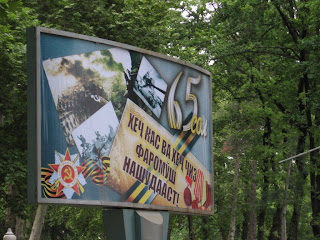
I thought it was time I wrote about the Thanksgiving turkey since it's almost Christmas. Another thing that I rather enjoy about Dushanbe is the challenge of finding certain foods. Sometimes this is frustrating, but I usually enjoy it because it's a chance to practice my language and interact with locals. The turkey was a case in point. It was a week before Thanksgiving and I was hosting a post-Thanksgiving gathering at my place. I wanted a turkey, but was prepared to buy several chickens as a substitute. Last year at this time several larger supermarkets had frozen turkeys (from Brazil, of all places) but this year they were no where to be found. So I asked around the international community and found out about a place outside a large market where they had live turkeys they would butcher for you upon purchase.
Based on the description of where this place was, I went to that area outside the market at about 5:00 PM the Tuesday of Thanksgiving. This is the place behind the large produce market where they sell mostly root vegetables in bulk. I think it's where people from smaller shops come to buy their vegetables. I asked a carrot and potato seller if he knew about turkeys, and he took me to a stall a couple sellers down where there was an empty pen. Since no one was there, he said we would go look for the seller, who apparently lived behind the row of stalls. So I followed the man down a narrow sort of walking alleyway, avoiding the gutter with water running to the street. We came out into a courtyard with simple dwellings around it. (Don't worry, there were still lots of people around). He asked at a couple of places until someone told him to come back the next day at 7 or 8 in the morning to find turkeys. He led me back out to the market area and told me that I should come find him before going to buy the turkey, because they would give him a better deal. "If they see you, they will make it expensive," he said. I thanked him for his help, but decided to negotiate the price on my own, since I think people are usually fair.
I didn't have time the next morning but I returned the morning of Thanksgiving to find the same pen with several turkeys in it. Bingo! I began talking to the man about the different sizes and prices of the birds. "That big one is 150 somoni," he said, which seemed like a good price. "Fine," I said, "I'll take it." Then the man said "are you married?" Oh no, I thought. Here we go again. What does me being married or not have to do with buying a turkey? I said that yes, I was married; it's my usual answer when men I don't know ask that question. It's much easier than responding to all the follow up questions and comments, which could include the suggestion that I marry a Tajik man. The turkey seller continued: "was it your husband that came yesterday and ordered the big turkey? A foreign man was here and ordered it and said he would come today." Darn. "No," I replied, "I didn't order a turkey. I'll take one of the smaller ones. I don't want to take one someone else ordered." So we agreed on a price of 80 somoni (just under $20) for one of the smaller birds.
The man went into the pen and the turkeys started gobbling. They knew something wasn't right. Wasn't it just the day before that Tom had disappeared after the man entered their pen? The man grabbed one of the birds under his arm and walked out of the pen. He sharpened his knife on the edge of the cement gutter and that was the end of the poor bird. While he plucked the feathers and poured boiling water over it to clean the down off, I went into the main part of the market to buy some other things.

When I returned, he put the turkey in a couple layers of plastic bag and I took it home. Since it was a couple days before my party I froze it, knowing that meat goes bad quickly because there are no preservatives. It was a bit tougher than a Butterball, but the flavor was good, and I made some tasty soup with the bones.
Here's the final product:









































